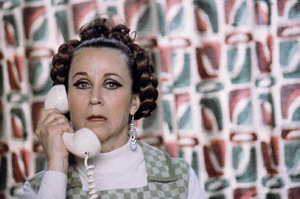
This month, Sony Pictures Classics began theatrical re-releases of 8 of Pedro Almodóvar’s films. This mini-festival, under the moniker
Viva Pedro, is a marketing build up to the release of his latest film
Volver in November. However, it is also a great opportunity to see many of these films again on the big screen. Last night was the opening film in the series,
Mujeres al borde de un ataque de nervios which I haven’t seen in quite a while.
It’s aged well. The color and action still explode with the manic energy of Almodóvar’s work from this period. Probably more due to my aging than the film's, Carmen Maura is even more hypnotizing than I remember creating one of those performances that it is impossible to look away from. I remember her being good, but frankly not this good. The film is still very funny and hearing people laugh out loud in a movie theater is always a refreshing and too infrequent experience.

Of course nothing’s perfect and the criticisms of Almodóvar’s work are apparent here as elsewhere in his oeuvre. The women aren’t so much characters as fleshed out drag queens. Like many of the 20th century's great directors, the misogyny is sometimes hard to ignore though unlike Hitchcock it is better disguised and certainly mixed with a great deal of love as well.

No doubt there are moments in the film that presage Almodóvar’s melodramatic masterworks that were yet to come. Most notably, and in the film’s most direct homage to
Johnny Guitar, the viewer sees Ivan dubbing Sterling Hayden while sharing the frame with Joan Crawford’s silent projected image. Later, we see Pepa, alone on the soundstage, dubbing Crawford in the same scene. But this time Almodóvar focuses only on Maura’s face and her emotional reaction to Ivan’s earlier performance as it plays back in her headphones. Pepa and Ivan are speaking not only other character’s lines, but lines whose original emotional content has been eroded by both time and repetition. Yet, at the same time the lines are re-invested with meaning given that Ivan has abandoned Pepa. Almodóvar in this single scene makes a masterful argument for melodrama and its importance and power as a cinematic genre at a time when this was not a widely held view. The rehabilitation of melodrama would continue and expand not only in Almodóvar’s films but elsewhere in such work as Todd Haynes’
Far From Heaven.
Perhaps
Mujeres is the cinematic equivalent of Verdi’s
Nabucco – an early important work that was eventually followed by a largely uninterrupted string of masterpieces: the underrated
Carne trémula, followed by
Todo sobre me madre,
Hable con ella,
La mala educación, and now
Volver. If Verdi’s career is in fact the template for Almodóvar’s, and his own
Aida,
Otello and
Falstaff are yet to come, Viva Pedro indeed.









Follow Along
Brian
Los Angeles
Follow me on Twitter